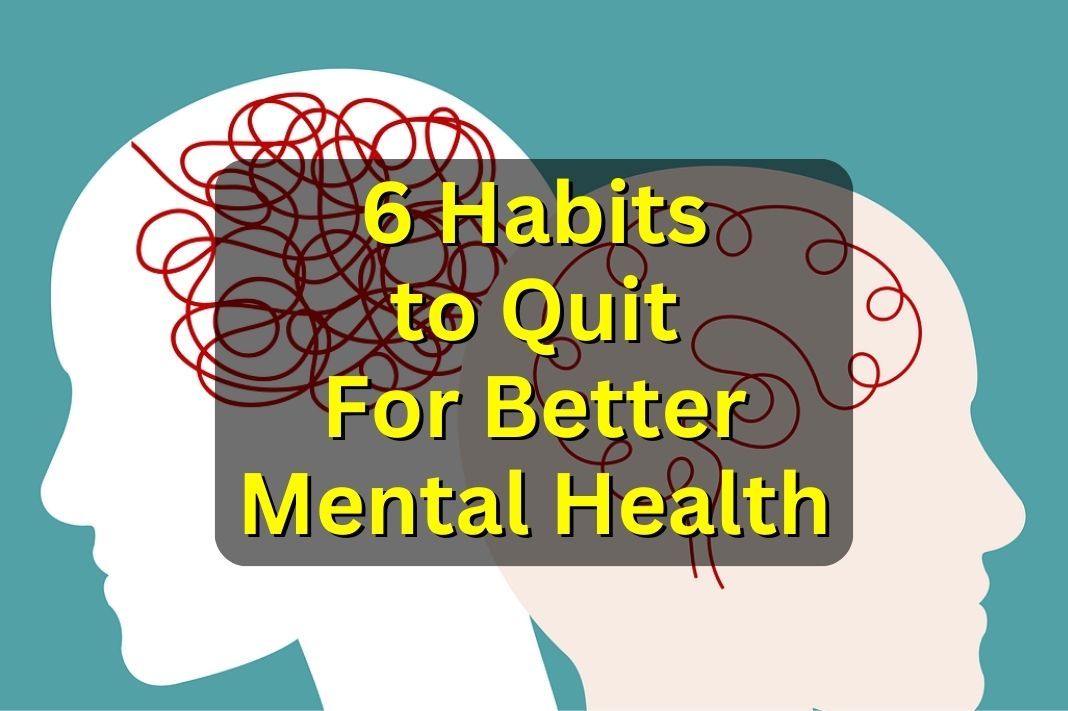Introduction
Habits are those pesky patterns etched into our lives, sometimes for better, often for worse. We’ve all heard the rallying cry of habit formation, but it’s high time we turn our attention to the flip side: breaking habits. As the cold winds of winter draw near and the specter of seasonal depression looms, there’s no better moment than now to delve into the subject of mental health. In this essay, we’ll explore six habits that you should bid farewell to in your quest for improved mental well-being.
Stop: Spreading Yourself Too Thin
Life, like a relentless whirlwind, hurls responsibilities at us faster than we can catch them. Juggling family, work, social life, and sundry obligations can leave you feeling like an overused rubber band—stretched to the limit. While productivity gurus might sing the praises of multitasking, consider this: at what cost?
Sure, you’re getting things done, but at what expense? The relentless stress of an overbooked schedule can unleash havoc on your mental and physical well-being. If weekend after weekend finds you in a frenetic whirl of lunch dates, dinner parties, fairs, and errands, the strain will eventually take its toll.
Do: Give Yourself Time
Reclaim your sanity by granting yourself precious moments of solitude. It may feel alien at first to say no to the barrage of “obligations,” but it’s a small sacrifice for peace of mind. Carve out time before reentering the fray of responsibilities. Handling tasks under duress yields subpar results, breeds irritation over trifles, and robs you of presence with loved ones. Plan your days wisely, allowing for cherished “me time” while maintaining your productivity with the aid of a trusty planner.
Stop: Always Saying Yes
In the grand theater of life, sometimes the best role for you is not that of the eternal “yes-person.” An unceasing chorus of affirmatives can amplify stress and inadvertently convey an eagerness you may not genuinely possess. Before you know it, you’re entrenched in a cycle of reluctant compliance, a mental quagmire that offers little solace.
Do: Say No Sometimes
Resist the urge to perpetually appease. Saying no is not a herculean feat but a form of self-care. Society’s penchant for teaching us the virtue of yes from a tender age may be challenging to surmount, but it’s essential. Embrace the art of saying no to tasks that don’t ignite your joy. Those who truly care for you will respect your boundaries, understanding that happiness is paramount.
Stop: Isolating Yourself
When shadows of despair darken your doorstep, it’s tempting to withdraw into the cocoon of isolation. Yet, solitude can be a double-edged sword, inflicting wounds of loneliness and deepening emotional wounds. Social isolation often springs from a maelstrom of factors, including disabilities, emotional pain, social anxiety, and depression.
Do: Surround Yourself With Loved Ones
Seek refuge in the warm embrace of those who cherish you. The presence of empathetic souls can banish the specter of loneliness and provide a channel for venting frustrations—an underrated but invaluable catharsis. Choose your companions wisely, favoring those who radiate positivity, for their presence can serve as a lifeline, pulling you from the abyss of negativity.
Stop: Writing Things Off
Mental distress is a silent marauder, often dismissed as a fleeting mood swing. This cavalier attitude towards prolonged negativity can spawn more significant problems. When negativity persists beyond your personal norm, take heed.
Do: Get Professional Help
The stigma around therapy should not shackle your pursuit of well-being. Reach out to professionals, unburden your thoughts, and let the healing begin. Therapy isn’t an admission of weakness but an acknowledgment of the strength to confront your inner demons. Online psychiatrists, equipped to provide one-on-one support, can be your lifeline in times of need.
Stop: Neglecting Your Physical Health
The intricate dance between your mental and physical health is undeniable. Neglecting one invariably tarnishes the other. A feeble body begets a fragile mind, and vice versa. An unhealthy lifestyle casts a long shadow, with dire consequences for both your body and soul.
Do: Adopt Healthy Habits
Rekindle the harmony between your body and mind through healthy habits. Prioritize the gift of sleep, an elixir for mood improvement, enhanced immunity, and memory enhancement. Conquer insomnia with the soothing embrace of essential oils. Exercise regularly and nourish your body with well-balanced meals, bidding farewell to the allure of fast food. Slowly, but surely, you’ll transform into a healthier and happier version of yourself.
Stop: Refusing to Treat Yourself
In the hustle and bustle of life’s demands, the act of treating oneself often becomes a guilty pleasure, if it happens at all. We toil tirelessly, deferring our desires in the name of duty.
Do: Whatever Makes You Happy
Reward yourself; you’ve earned it. An at-home date, drenched in the hues of your favorite music and a self-prepared feast, can be an inexpensive yet soul-rejuvenating experience. Paint, watch movies, or dive into a book that stirs your soul. Cap it all off with a sumptuous bath, complete with candles and essential oils, ensuring a spa-like indulgence without breaking the bank.
Conclusion
As we bid adieu to these counterproductive habits, remember that change is not linear; it’s a symphony of ups and downs. Implementing these tips even once can set you on the path to better mental well-being. Break free from the shackles of over commitment, embrace the power of saying no, foster connections, seek professional help when needed, nurture your physical health, and indulge in self-care. These are the stepping stones to a brighter, healthier mental landscape. So, as you navigate the labyrinth of life, let your habits be your allies on this journey towards a happier, more balanced existence.


